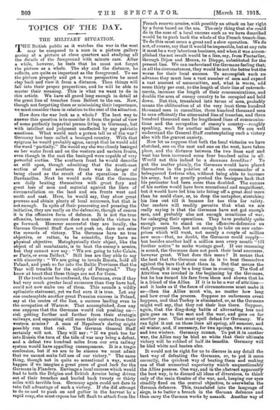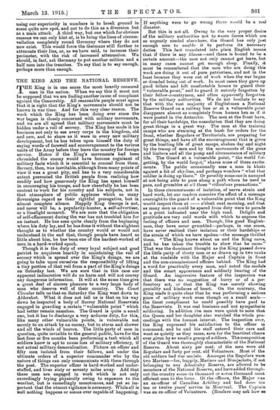TOPICS OF THE DAY.
THE MILITARY SITUATION.
THE British public as it watches the war in the west may be compared to a man in a picture gallery gazing at a picture at close quarters and studying all the details of the foreground with minute care. After a while, however, he feels that he must not forget the picture as a whole. The sky and the distance, he reflects, are quite as important as the foreground. To see the picture properly and get a true perspective be must step back and view it from a distance. Then things will fall into their proper proportions, and he will be able to master their meaning. This is what we want to do in this article. We have all gazed long enough in detail at the great line of trenches from Belfort to the sea. Now, though not forgetting them or minimizing their importance, we must consider them in relation to the rest of the situation.
How does the war look as a whole ? The best way to answer this question is to consider it from the point of view of some perfectly impartial person living in Germany, but with intellect and judgment unaffected by any patriotic emotions. What would such a person tell us of the war ? Germany has been called a besieged country. With that epigram he would probably agree, except that he would add the word "partially." He would say she was closely besieged on her water front and on the western and eastern fronts, even though in the east the besieged were capable of very powerful sorties. The southern front he would describe as still open, though admitting that the south-east section of that southern front was in danger of being closed as the result of the operations in the Dardanelles. Next he would note that the Germans are daily beating themselves with great fury and great loss of nrien and material against the lines of eircumvallation on the land and sea fronts west and north and east. Here, he would say, they show great prowess and obtain plenty of local successes, but that is not enough. In spite of their possessing and pressing the initiative, they are really on the defensive, though of course it is the offensive form of defence. It is not the true offensive, because success does not enable the victors to go forward. However successful they are locally, the German General Staff dare not push on, dare not seize the rewards of victory. The Germans have no true objective, or rather, to be scientific, they have no physical objective. Metaphysically their object, like the object of all combatants, is to beat the enemy's armies, but they cannot now say : "We are going to take Calais, or Paris, or even Belfort." Still less are they able to say with sincerity " We are going to invade Russia, hold all Poland, and push so far into the Baltic Provinces that the Tsar will tremble for the safety of Petrograd." They know at heart that these things are not for them.
If the truth must be confessed, the Germans, even if they had very much greater local successes than they have had, could not now make use of them. This sounds a wildly optimistic statement, yet we feel sure it is true. Let any one contemplate another great Prussian success in Poland, say at the centre of the line, a success leading even to the occupation of Warsaw. That accomplished, does any one suppose that the Germans would risk pushing on— risk getting further and further from their strategic railways, and separating still more their eastern from their western armies ? A man of Napoleon's daring might possibly run that risk. The German General Staff certainly will not. They will say : "If we push too far into Russia the turn of the tide of war may bring a defeat, and a defeat two hundred miles from our own railway system would have appalling consequences. It is a tragic confession, but if we are to be sincere we must admit that we cannot make full use of our victory." The same thing, though not in quite so sensational a way, would happen if we imagine a great piece of good luck for the Germans in Flanders. Envisage a local success which would lead to both the Belgian and British Armies being driven out of their trenches and hurled back twenty or thirty miles with terrible loss. Germany again could not dare to take full advantage of such a victory. If she did attempt to do so and to push on and gather in the harvest by a rapid coup, she must expose her left flank to attack from the French reserve armies, with possibly an attack on her right by a force based on the sea. The only thing that she could do in the case of a local success such as we have described
would be to push back the whole of the French trench-line. To do this must mean a great and a slow operation. We do
not, of course, say that it would be impossible, but at any rate it must be a very laborious business, and when it was accom- plished the net result would be a line, say, from Pontarlier, through Dijon and Meaux, to Dieppe, substituted for the present line. We can understand the Germans feeling that in all the circumstances, they would be not the better but the worse for their local success. To accomplish such an advance they must lose a vast number of men and expend a vast amount of ammunition, and, what is worse, add some thirty per cent, to the length of their line of entrench- ments, increase the length of their communications, and double the area of enemy country to be occupied and held down. But this, translated into terms of u:en, probably means the obliteration of at the very least three hundred thousand men in casualties, three hundred thousand men to man efficiently the attenuated line of trenches, and three hundred thousand men for lengthened lines of conituuuica- Sons and the occupation of enemy's country—roughly speaking, work for another million men. We can well understand the General Staff contemplating such a victory also with the gravest anxiety.
Now let us suppose that both the local victories we have sketched, one on the east and one on the west, have taken place, and the distance between the two lines east and west has been increased some four hundred miles in all. Would not this indeed be a dantnoso hereditas I To put the matter plainly, the Germans would have placed themselves in the position of a rash commander of a beleaguered fortress who, without being able to increase his army, had so greatly pushed the besiegers back that his perimeter had been more than doubled. The success of his sorties would have been sensational and magnificent, but it would have led him into biting off a great deal more than he could chew, or, to drop the metaphor, stretching, his line out till it became far too thin for safety. Our readers will readily perceive that what we are really saying is that the Germans have not got enough men, and probably also not enough munitions of war, for enlarging their operations. They have probably quite enough men to stand on the offensive-defensive on their present lines, but not enough to take on new enter- prises which will want, not merely a couple of million new men—that, no doubt, the Germans could supply— but besides another half a million men every month "till further notice" to make wastage good. If our reasoning is sound, the Germans dare not push their local successes. however great. What does this mean ? It means that the best that the Germans can do is to beat themselves against the bars that shut them in. But that means the end, though it may be a long time in coming. The God of Attrition was invoked in the beginning by the Germans, but Ile has turned his face from them and shown that he is a friend of the Allies. If it is to be a war of attrition— and it looks as if the force of circumstances must make it so—then the Allies must win, no matter how long and how cruel the process. Suppose no unforeseen event happens, and that Turkey is eliminated, or, as the Germans might well say, that they cut their loss there. Suppose, again, that the ding-dong battle of alternating lose and gain goes on to the east and the west, and goes on for another year. That must spell defeat for Germany. We can fight it out on these lines all spring, all summer, and all winter, and, if necessary, for two springs, two summers, and two winters. Germany cannot. To put it in another way, the Allies may be bled so white that their ultimate victory will be robbed of half its benefits. Germany will be bled white and beaten also.
It would not be right for us to discuss in any detail the best way of defeating the Germans, or, to put it more correctly, the quickest way of beating them and making use of that numerical superiority which unquestionably the Allies possess. One way, and in the abstract apparently the best way, is to discard all ideas of diversions, to think only of the main theatre of the war, and, keeping our eye* steadily fixed on the central objective, to overwhelm the German defences. This, translated into the language of siege, is to batter a breach in the German defences and then carry the German works by assault. Another way of
using our superiority in numbers is to break ground in some quite new spot, and not to do this as a diversion but as a main attack. A third way, but one which for obvious reasons we can only hint at, is to bring the lines of circum- venation completely round Germany where they do not now exist. This would force the Germans still further to attenuate their line, or, as we have said, to increase their perimeter, with the risk of increased attenuation. We should, in fact, ask Germany to put another million and a half men into the trenches. To say that is to say enough, perhaps more than enough.



































 Previous page
Previous page